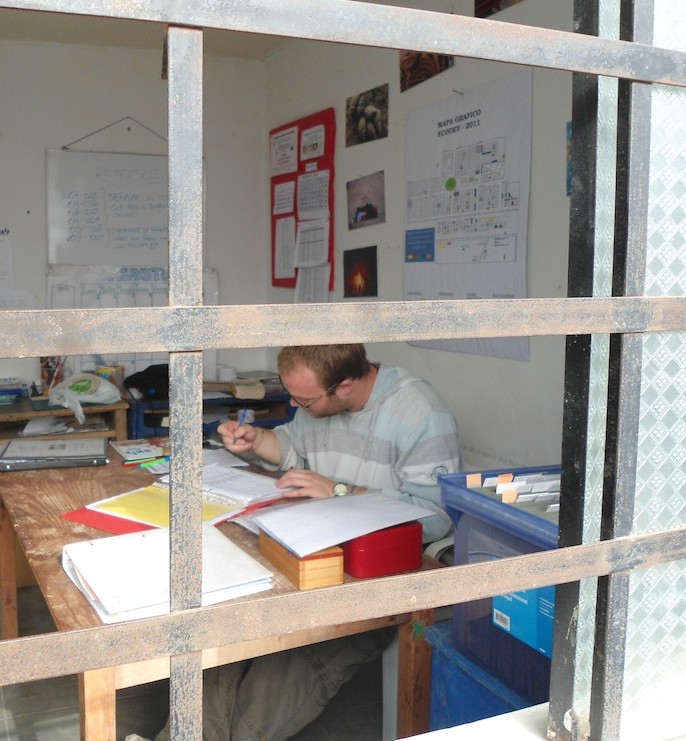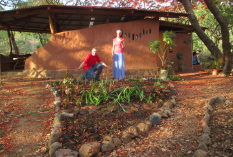I’ve been out of university for four years now, and both my study abroad and internship abroad experience have helped me build the international business career I have today — and the career I hope to grow for the rest of my life. In fact, I know that without my experience living and working abroad relatively early on, I would not have been qualified for some of the positions I have held in the past several years.
During college, my classmates mostly chose internships in banking or consulting, spending summer after summer in New York City or Chicago, performing similar tasks in similar environments, not only in terms of job-related repetition but also in terms of how they stood out in our peer group. Everyone, essentially, was trying to get to Wall Street and everyone was taking nearly identical paths to get there.
I proudly defied that norm. I spent summers studying international relations in Singapore, working for an NGO in Guatemala that had me designing small business plans in Spanish, and running the marketing initiatives of the Ashoka Foundation in their Middle East branch. When it came time to apply for a job post-graduation, I didn’t regret my decision to intern abroad and take an alternate path for a minute.
 I actually landed every interview I wanted and beat out many of my classmates who actually interned in consulting, receiving an offer to join IBM’s Global Business Services division in New York City. Because my resume was very different from my peers and I learned how to share the experience I gained abroad in a way that was relevant to the consulting industry, it created a “package” that made sense to a wide variety of employers, both local and global.
I actually landed every interview I wanted and beat out many of my classmates who actually interned in consulting, receiving an offer to join IBM’s Global Business Services division in New York City. Because my resume was very different from my peers and I learned how to share the experience I gained abroad in a way that was relevant to the consulting industry, it created a “package” that made sense to a wide variety of employers, both local and global.
Benefits of Interning Abroad
As I learned firsthand, the benefits of having international internship are clear, universally well-regarded, and continue to pay out dividends many years after completion. Namely, there are four key benefits from working abroad as an intern:
- Lends relevancy to other international roles.
I’m famous for saying, “International experience begets international experience.” When hiring for a global role, or even a role that works cross-culturally in a domestic setting, human resource managers want to see demonstrated experience (as does anyone hiring for any job in any country at all). If your dream is to land a role that involves traveling or working on international projects, it’s a huge advantage to be able to prove that you’ve already worked successfully in similar settings. Getting that experience under your belt early on helps you get hired to do more and more of it.
- Provides ability to transfer skills to international and domestic roles.
Working abroad lets you build a wide and deep skill set, often gained more rapidly than if you’d been working in your own country. A sample of skills obtained from interning abroad that are of interest to a wide variety of employers: working with ambiguity, communicating well, communicating across language barriers, communicating in other languages, forging new relationships, building trust, working in cross-cultural teams, problem-solving, overcoming a lack of resources, taking on additional roles and responsibility (probably above your experience level), adapting to unforeseen circumstances, understanding a new country and region, exercising patience, researching well, and testing out new ideas in foreign environments.
- Makes your CV stand out.
When a hiring manager receives hundreds of CVs a day from comparably qualified candidates, he or she is looking for anything that makes one individual stand out over the others. Seeing that you worked in marketing in China for a summer and perhaps speak one or two foreign languages is an immediate draw. This is sometimes referred to as the “airport test.” The hiring manager thinks, “Would I want to be stranded in JFK for 5 hours with this person? Would they have interesting things to chat about over beers at the airport bar?” By standing out, you increase your chances of getting an interview, which often proves to be the hardest part of the job hunt.

-
Gives you better material to work with in interviews.
Once you’ve scored the interview, now is your chance to wow them with your reservoir of unique experiences. You have done the same things as any Wall Street intern — worked in teams, problem-solved, learned new skills, made some mistakes, and created value for your organization — but you’ve done it in an environment vastly different from any other candidate. Relating those quirky challenges and showcasing your seamless adaptability is one of the most important ingredients in nailing the interview.
8 Steps to Landing the Job
Now that we’ve reviewed some of the benefits of interning abroad, how do you actually use this experience to get a “real job” after graduation? How do you take experiences that seem to have occurred in the special time and space far away from home and convince a recruiter from Hartford, Connecticut that his firm in New York should hire you and not the other candidates who worked in a virtually identical role and environment last summer?
Let’s lay out an 8-step process to knocking it out of the ballpark.
- Figure Out What Job You Want
This is a basic best practice for any job hunt, but you need to understand the exact role you want and research the companies that provide that kind of opportunity. Saying you want to do “something in international development” is not constructive for your search. Ideally, you should sit down and draft a list of your skills and experiences and, from that list, create a job description that matches both what you want to do and what you are qualified to do. Knowing specifically what you’re looking for will help you narrow down opportunities where you are a top contender.
- Do Your Research
Before you even you apply to a job, you want to have done a good amount of research so you are able to tailor your CV and cover letter to address each requirement of the job description in your application. Good ways of doing this are to talk to current employees, read articles published on the company in the past few years, read through their website very carefully, and know as much about each opportunity as if you were already an employee. By conducting thorough research, you’re able to see how the company speaks about itself and reflect the tone and type of language back in your application materials. Telling your story in their lingo ensures that the fundamental importance of the work you accomplished is less likely to slip past them.

- Focus on YOUR contribution
This is a very common error on many people’s resumes: not focusing on what they did, but on what the organization does. No hiring manager cares what the organization you worked for does (they can Google that); they want to hear about what your impact was. Focus on the skills gained through your individual experience and how the company gained specifically as a result of your participation.
- Quantify Your Impact
Apply numbers that take what you accomplished from subjective to objective, and make it more credible to an outsider. For example, did you lead a team of 25, raise $10,000, gain 5,000 Twitter followers, collaborate with 15 other companies, or create a 5% increase in return on investment for the 2nd largest project in the company? This is a practical way to “speak their lingo” — consulting firms, financial services companies, banks, international development organizations, and academics (really just about anyone) like to see numbers on a resume.
- Tell a Story
Recruiters need a streamlined idea of who you are and why you’ve done what you’ve done. While we all know that many times we do what falls into our path or because it seems like a good idea at the time, that kind of logic doesn’t often land good jobs. For example, I had once had what could appear to be a discrepancy on my resume: why did I spend a summer working at an Egyptian NGO when I was an Asian Studies major studying Chinese? But once I wove the research I did on the Chinese diaspora in Cairo into my story, it made sense and conveyed more intention in my experiences. The best thing to do is to think about your career goals will be supported by a particular internship experience before accepting it, but at least weave it into a cohesive narrative afterwards if need be.
- Be Prepared to Address Your Weaknesses
When I applied for my current job, I didn’t have any sales experience, so I used examples from my past where I exercised skills that prepared me to succeed in a sales role: researching, building relationships with clients, and presenting information. When I applied to be a consultant at IBM, I didn’t know much about spreadsheets or financial analysis, so I shared examples where I learned much harder things in an even shorter period of time. The key was proactively addressing areas of weakness in my resume and cover letter and then being able to demonstrate my claims in role-plays and case study interviews.
- Practice for the Interview Stage
Every interview is one do-or-die chance at the job, but you can’t let the pressure get to you. The best way to combat the anxiety of an important interview is to practice, ideally with someone who already works in that company or industry. Then take it up another notch and find books written about how to ace job interviews in your specific industry. For example, before embarking on interviews with just about every consulting firm in the country, I bought the infamous Case in Point and practiced all of the case studies (several times over) with my friends from the business school. Eventually I was tackling even the toughest interview questions that my course of study or internship experience hadn’t prepared me for.
 Create an Inventory of Experience
Create an Inventory of Experience
In my opinion, the best way to prepare for an interview isn’t to rehearse or outline specific answers to the most common interview questions. Instead, document a group of 15-20 experiences you’ve had that relate to the topics you’re likely to face in an interview: strengths, weaknesses, teamwork, leadership, challenges, and aspirations. Practice telling these stories and sharing the lessons they taught you so that you’ll be able to draw on those examples and relate them to whatever questions you’re asked on interview day.
Bridge the Gap
Regardless of whether you did internships in California or Cameroon, the same principle applies: articulate your present skill set and past experiences with a well-researched enthusiasm that persuasively demonstrates your relevancy and capability to tackle the position you’ve got your eye on now. As long as you can communicate the depth of the contributions you’ve made to organizations around the world with confidence, you should have no problem translating those experiences into a full-time position.
Global Nomadic offers Professional Internships, Volunteer Projects and TEFL Programmes in 29 countries worldwide. Start travelling your career today!











